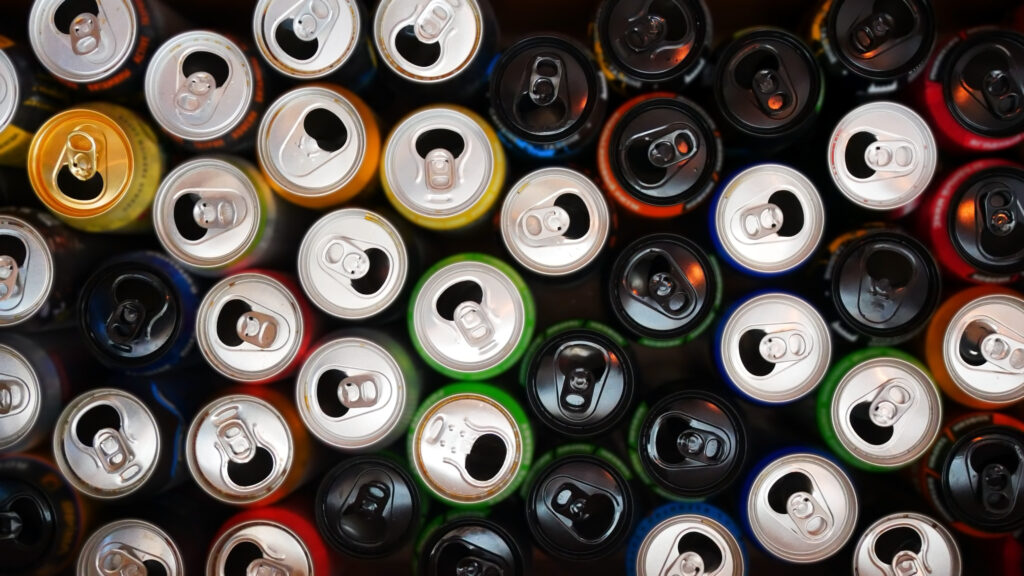Energy drinks are a type of non-alcoholic drink that offer us a better physical and mental performance as they provide that extra shot of energy that we sometimes need. Whether it’s for final exams season, athletic activities, or when we have an overwhelming amount of work or a hectic travel itinerary.
This extra shot of energy is mostly the result of the high concentrations of caffeine and sugar that energy drinks contain, among other ingredients that have become popular in the market of energy drinks, such as vitamins and natural ingredients like ginseng and guaraná. However, the reality is that some of these natural ingredients lack specific scientific evidence regarding their supposed properties.
In this blog, we analyze the effects of energy drinks on the body, as well as their effectiveness in relation to what they promise, and the possible risks that regular consumption of these drinks entails.
These drinks can enhance our alertness, and on a physical level, they increase blood pressure, heart rate, and respiratory rate, granting that extra shot of energy and alertness that we might need.
The most common substance in energy drinks is caffeine, which is the most consumed psychoactive substance worldwide. But the problem itself is not the caffeine, it’s the amount we consume. Depending on the brand and the size of the container, the caffeine concentration of an energy drink can vary from 80 mg to 160 mg and even more.
It is true that caffeine increases our mental performance, and when it’s consumed before practicing sports, caffeine could improve our performance and endurance during prolonged activities. However, excessive caffeine consumption can cause dehydration as it has a diuretic effect. In addition, it can also cause various problems such as changes in the sleep cycle, irritability, nervousness or anxiety. Ironically, it is also believed that in some cases, it can cause problems with retaining information or focusing.
In addition to caffeine, energy drinks may contain large amounts of sugar, which can also affect our health. It is a fact that sugar is a source of energy that the body synthesizes, but the risks of excessive sugar consumption outweigh the benefits that an energy drink could provide. It is important to note that sugar is linked to several health problems such as type-2 diabetes, overweight, and cavities.
The amount of ingredients vary depending on the brand and the size of the container, but to give you a general idea, energy drinks usually contain around 11 grams of sugar per 100ml. So, we could estimate that the amount of sugar in a 250 ml to 500 ml energy drink can range from 30 to 60 grams, which would be the equivalent of about 12 coffee spoons of sugar. Therefore, an energy drink of 500 ml would exceed the daily sugar intake that is considered safe for human consumption, according to the World Health Organization (WHO).
Nowadays, it is easy to find sugar-free alternatives, which contain sweeteners instead. While it is true that the sugar-free versions are relatively healthier and there are no known adverse effects, the research on regular consumption of sweeteners is limited. Therefore, it is not known for sure what the adverse effects of having energy drinks on a regular basis could be. Some sources infer that they could have negative effects on our intestinal microbiota.
Among the other active ingredients of energy drinks, it is normal to find taurine, which is an amino acid that can naturally be found in meat, fish, dairy products, eggs, nuts, and legumes.
Taurine has many functions such as regulating the functioning of the cardiovascular system and the central nervous system. However, the amounts of taurine found in energy drinks are much higher than what we can find naturally in food. On the other hand, the studies that have been performed on the consumption of taurine, have not shown that it actually improves physical and mental performance. Therefore, we can conclude that taurine and its energy boosting effects are marketing strategies.
As mentioned, energy drinks normally include vitamins, which are mostly of type B, such as vitamin B3 and B6. These vitamins do contribute to energy and mental performance, and reduce tiredness and fatigue. The advantage of type B vitamins is that the risk of overdose is very unlikely. If we take more than the body needs, the excess will be naturally eliminated through physiological processes.
Regarding the natural ingredients that energy drinks contain, such as ginseng and guaraná; these are considered active ingredients that produce a biological effect in our body, like caffeine does. But despite the popularity of these ingredients, the information available regarding their effectiveness in combination with all other ingredients of energy drinks is quite limited. In the long run, it could be a risk as active ingredients will cause a reaction in the body, which then could cause side effects or even negatively react with medications. For example, ginseng is contraindicated in people with heart problems, high blood pressure, and anxiety.
Guarana, on the other hand, naturally contains caffeine, which could increase the caffeine levels in an energy drink and be counterproductive if these drinks are consumed excessively.
When we consume energy drinks in excess, the cardiovascular system is the most affected as blood pressure can dangerously raise, which increases the risk of suffering a heart attack or a stroke. Excess of energy drinks could also cause irregular heart rhythm which will increase the risk of having lethal arrhythmias.
Lastly, it is important to point out the effects of these drinks if they are combined with alcohol, which is a common practice nowadays. Mixing these drinks with alcohol can be dangerous as the effects that energy drinks can have on the body and nervous system could mask the effects of alcohol, and this could lead to a higher alcohol intake. By mixing these drinks with alcohol, confusing signals are sent to the nervous system and because of this, dangerous levels of alcohol could be reached.
Having said this, we can conclude that more research is needed on the effects and possible risks of energy drinks, and the active ingredients they contain. The consumption of these drinks should be moderate and it is important to be aware of the possible risks that they imply.
Sources:
- https://www.aesan.gob.es/AECOSAN/docs/documentos/seguridad_alimentaria/evaluacion_riesgos/informes_comite/BEBIDAS_ENERGETICAS.pdf
- https://pubmed.ncbi.nlm.nih.gov/23206286/
- https://www.ahajournals.org/doi/full/10.1161/JAHA.118.011318
- https://pubmed.ncbi.nlm.nih.gov/30721958/
- https://www.ncbi.nlm.nih.gov/pmc/articles/PMC4682602/
- https://www.ncbi.nlm.nih.gov/pmc/articles/PMC8083152/
Category: Lyfestyle, Product Information


